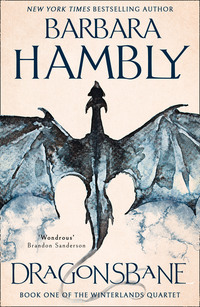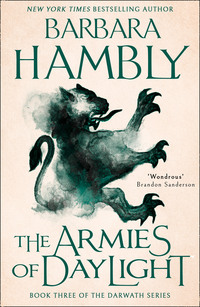The shadow flitted from tree to tree, working through the woods above the road. Probably headed for the refugee camp, Gil guessed. That’s the only thing in that direction. At least somebody’s showing a little compassion, for all the good it’s likely to do.
In that case, it was her business. There was barely time to make it there and back before darkness fell. Gil paused in the road and, for the benefit of the fugitive, snapped her fingers and cursed as if she had forgotten something, then turned and hastened back. Once out of sight of the watcher’s probable course, she doubled back through the rocks at the road’s edge and scrambled her way to higher ground. She slipped between two shaggy-barked fir trees to wait, her dark cloak blending with the gloom of the shadowy afternoon, the white quatrefoil emblem of the Guards on her shoulder like a patch of snow on wet-darkened wood. In time she saw that cautious figure emerge from the trees, hurrying along the path above the road, keeping a wary eye on the backtrail, and huddling for warmth in the folds of a black fur cloak. The hood had fallen back. A great jeweled clasp glittered like stars in the raven knots of hair.
It was the cloak Gil recognized. Only one woman in the Keep had a cloak like that.
“My lady!” she called out, and Minalde stopped, eyes startled and wide. Gil stepped from between the trees.
“Please go on back,” Alde said hastily, brushing the stray ends of her hair away from her face. “I’m not going far, and …”
“You’ll never make it there and back by dark,” Gil said bluntly.
“I— I’m not going to the refugee camp.” The younger girl drew herself up, standing on her dignity. Her expression reminded Gil of her own younger sister when she lied.
“And you shouldn’t be going there alone,” Gil went on, as if she hadn’t heard.
Alde would never make the big leagues as a liar. “But I have to,” she protested. “Please don’t stop me. There’s plenty of time …”
“They’re camped outside the Vale, down at the Tall Gates,” Gil stated unequivocally. “It will be dark in a little over two hours. And besides …” She took a step toward Alde, and the girl fell back, like a deer on the edge of flight. Gil stopped herself and spoke more softly. “And besides,” she continued gently, “if they learned who you were, you might never make it back at all.”
“They won’t know,” Alde insisted, still keeping her distance. “I’ll be all right.”
Gil sighed. “You can’t know that.” She took another step, and Alde retreated warily.
Rudy had said once that Minalde’s crazy courage was equaled only by her stubbornness. Gil saw now what he meant. “At least don’t go alone,” she said.
Alde flushed a little and began contritely, “You don’t have to …”
“Christ knows, somebody should!” Gil turned on her heel and started back toward the entrance to the Vale, cutting through the snowy woods. “This way’s quicker, and we can circle to avoid being seen from the watchpost on the road.” Alde followed in her wake without a word.
It took the girls a little over an hour to reach the camp. As Gil had surmised, the newcomers had taken over the Tall Gates, ancient watchtowers that in former times had guarded the principality around the Keep from the smaller, less organized realms of the valleys below. As the Realm had spread, the towers had ceased to be a frontier and had been allowed to fall into ruin. As ruins they remained, vine-grown cliffs of mortared stone dominating the narrow neck of the muddy road, strongholds only of bird and beast.
The girls were met on the road by a thin, gray man – who had once been very fat indeed, to judge by the sacklike wrinkles of his deflated chins – carrying a spear and wearing over a scarecrow assortment of rags a soiled cloak of gold-frogged velvet. Alde gave their names as Alde and Gil-Shalos, from the Keep of Dare, and asked to speak with his lord.
Ankle-deep muck pulled at their feet as they crossed the square before the northern watchtower. The place smelled like a privy, wreathed in a perpetual haze of woodsmoke. The pitiful flotsam of flight littered the ground. Meager bundles of possessions, stray cook pots, and little heaps of firewood were scattered over the dirty snow. Men and women sat huddled miserably around their fires or moved among them slowly. The place seemed very quiet, except for the weak, persistent crying of a child. Gil felt ashamed of her cloak, her strength, and the marginal ration of food she’d wolfed down at noon. Beside her, Alde looked very white.
Their escort halted before a brush shelter. In the shadows at the back of it, Gil thought she could discern a small, stiff figure, lying completely covered by a ragged quilt; a man sat on a bed of cut pine boughs near the open end of the shelter, quietly holding the hands of two boys who with tear-blotched faces slept huddled at his side. He looked up inquiringly as the shadows of Gil and Minalde fell across the light.
“M’lord?”
The man got slowly to his feet, careful not to wake the boys, and limped from the shelter. Gil recognized him at once as the monk who had spoken for the refugees when Alwir had turned them away at the gates of the Keep. “Yes, Trago?” Dark eyes sunk into leathery hollows moved past him to Gil and Alde, then rested for a moment on Alde’s face. “Yes,” he said quietly.
“You may go, Trago. Get someone to stay with the boys, if you would.”
Trago saluted and moved away through the camp.
The man turned back to them, and Gil noticed how waxy his skin looked under the black tangle of unkempt beard. “I am Maia of Thran,” he introduced himself in that same quiet voice. “Bishop of Penambra.” Alde started to speak, startled, and he smiled suddenly, his teeth very white in his beard. “I believe my predecessor assisted at your wedding, my lady,” he said. Color flooded into Alde’s cheeks that no cold could account for. He continued gently. “I was captain of his Guards.” He inclined his head to her, a sign of reverence to her rank. There was no irony in his voice as he said, “Welcome to what is left of the city of Penambra.”
“I’m sorry,” Alde said quietly. “Please don’t think I came – idly, or – or—”
“I do not,” he replied reassuringly. “But I assume that, as you did come incognito and without retinue, your visit is less than official.”
Only a fool could have watched the interplay between Alwir and his compliant sister at the Keep gates yesterday and remained ignorant of how the land lay, Gil thought; and this tall, gaunt scarecrow in his ecclesiastical rags did not look like a fool. It was within a few percentage points of certainty that he knew that Alde had come here without the Chancellor’s approval or knowledge.
Alde raised her eyes to meet his. “I’m sorry,” she said again. “But I couldn’t not come.”
“I understand,” Maia said, “and I thank you for your compassion.” He glanced around them at the camp. Men in the muddy rags of uniforms were making arrows by the warmth of smoky fires; women were tending children as best they could. There was the ripe smell of carrion cooking, the bubbling of thin soups, and the grating, persistent wailing of a child. “Still and all, I don’t advise you to come again. As legal ruler, I can still hold most of us from turning bandit. But by your next visit I may be dead or ousted. Tomorrow you may find yourself dealing with anyone. The Dark have taken a very heavy toll.”
Alde’s voice was timid. “Is Penambra truly destroyed, then?”
“Truly,” the Bishop said quietly. “Close to nine thousand of us left the city with wagonloads of goods, food, and all that we could carry away. You know Penambra – a city of bridges, built on a hundred islets in the bay. Rains flooded the town and trapped us in the cellars; and the Dark haunt those cellars, even in daylight. Half our provisions were lost to floods and half our people to the Dark before we even got clear of the town. Through the delta it was the same. The lands are flooded by the unseasonable rains and by the Dark, who have broken the levees on the rivers. What used to be the richest part of the Realm is deserted or peopled by ghouls who live by plundering the houses of the dead. It lies under terror of the Dark. They carry off as many as they kill outright. Did you know that?”
“Yes,” Alde said. “I knew.”
He looked at her closely, then nodded. “If you know that, my lady, and are still among us, you are more fortunate than I had thought.”
He folded long, bony arms. A singularly gentle man, Gil thought, to have been commander of the Church troops. A group of ragged warriors passed them, changing the camp guards, lank, dirty men and women with bows and axes. They saluted him as they walked by.
Maia sighed. “So. People spoke of the Keep of Dare, the old hold up at Renweth. In some places, enclaves of farmers have made little Keeps, fortified buildings along the river. Your brother is not the first to turn us away. But even those don’t seem to be proof against the Dark. We’ve found their fortresses smashed like eggshells, the defenders dead or wandering mindlessly. We’ve been beset by wolf packs, or dog packs hundreds strong. There was even a rumor of White Raiders in the valley … At times on the march here I felt it was the end of the world.” White teeth gleamed briefly through the tangled beard. “In some ways I think the end of the world would be a simpler matter to deal with. If what the Scriptures tell is true, at least that would be quick.”
“Oh, but it has been quick.” Alde looked around her at the desolate camp, her jewels glittering in her hair as she moved her head. “This summer all of us were sitting on our terraces, watching the sun in the leaves and dreaming of sledding and parties at the Winter Feast. Now, before the night of the Winter Feast, we may all be dead. That’s quick.”
Something in the black humor of this amused him, for he chuckled. “Possibly. Possibly.” The gray sky darkened overhead; he drew the rags of his cloak a little tighter about him. “But to have come here and to be told that there is neither food nor space by one with that monolith of the Keep at his back and his fat merchants in their ermine cloaks all around him … I do not know what I expected, my lady. But not that.”
Alde said nothing, but Gil saw the fire of shame burn her face.
A girl came running through the mucky confusion of the camp to the shelter by which they stood, calling, “M’lord! M’lord Bishop!” He stepped toward her, and she said, “Troops, m’lord. From up the road.”
Maia cast one quick look at Alde, meeting her blank surprise. Then they all hastened to see.
Before they reached the road, Gil could hear the sounds of the troop clearly over the unnatural silence of the camp. Behind the clinking of brass scabbard buckles, the soft slurp of boots in half-frozen slush, and the light jingling of mail shirts, she heard the whuffing breath of overworked horses and the creak of harness-work and wheels. The land on which the watchtower stood overhung the road, and the brink of it was jammed with silent, ragged watchers, but they made way for the Bishop and the two girls. Down below, Gil could see the troops hastening through the twilight – Janus on his stocky bay gelding, his red hair hidden by mail coif and helm, his eyes darting to take in every possible danger of the camp and the crowding woods beyond, Alwir’s troops in their scarlet livery, leading the horses that drew the empty wagons, looking uncomfortable and ashamed as they passed before the hungry eyes of those to whom they had denied food and shelter, and the double file of Red Monks walking guard, faceless in their masking helmets. The men and women around Gil watched this show of force pass by in silence; only one child in the back of the crowd cried out, asking if those men were going to give them food.
Beside her, Maia said softly, “They are fools to set forth anywhere this late in the day.”
Alde shook her head. “They had planned to be gone at noon. I don’t know what delayed them.”
Gil did, but held her peace. The latest quarrel between Alwir and Govannin had left its marks; though the force around the empty forage-wagons looked formidable, she would have doubled it, had it been up to her. She, too, remembered the farms burned by the Raiders.
The Bishop of Penambra did not move until the last wagon and the last of the rear-guard had vanished into the obscurity of the snowy woods. Then he said, “So they do not only harvest – they glean also, so that those who follow after must make a meal off the chaff.”
Alde glanced up at his tall figure, her face flushed with shame. She stammered, “We – we have need of all we can find. Alwir is raising an army, sending to the Emperor of Alketch for troops. They will burn out the Nests of the Dark at Gae, and so establish a place of safety from which we can reconquer the earth from the Dark.”
The straggly eyebrows raised, sending a whole laddering of wrinkles up the high forehead. “On several occasions the Empire of Alketch has been likened to the Devil, my lady, and it is true in this regard: they say that the Devil cannot enter any man’s house unless he is first bidden, but afterward, no man may bid him to leave. I think your brother would profit to take in the seven hundred or so warriors left to me, who are loyal to the heir of the House of Dare, before he gives his bread to enemies.”
“My brother says …” Alde began. She stopped, too ashamed to go on.
“Your brother is a man who keeps his own counsel,” Maia finished gently. He reached out his big, bony hand with its two crippled fingers, to rest on the black, soft fur that fell over her shoulders. “I understand, my lady. But speak to him for us. Tell him he will need our swords. Tell him anything. We cannot hold out here long, and there is no place on the face of the earth left to which we can go.”
“I will tell him.” Alde looked up into the gaunt, waxy face towering above her own.
“Speak for us,” Maia said, “and if ever you should need them, my lady, you may count on our swords and our hearts.”
“We can’t just leave them to starve!” Alde said fiercely. The twilight of the lonely road had closed down around them. Evening lay like a veil over the dark trees.
“Alwir can,” Gil pointed out
“He wouldn’t!”
“He’s already done it. To bring in the Penambrans without starving our own people, Alwir would have to institute some kind of rationing system. Govannin will never stand for that.”
“But she’s the Bishop!” Minalde insisted passionately. “She’s the head of the Church!”
“Sure,” Gil agreed coldbloodedly. “You think she’s going to welcome another Bishop into her bailiwick? And a commoner at that?” Gil had learned enough of the name structures in the Wathe to recognize what that “of Thran” meant on the end of Maia’s name: farmboy; plow-tailer; sharecropper, maybe; someone to be looked down upon by those scions of the ancient Houses who could boast that semiroyal “-ion” tacked onto their titles.
Alde sighed dispiritedly. “I wish you wouldn’t say things like that.”
“I can’t help it.” Gil shrugged. “I’m a born devil’s advocate. I’m not saying it can’t be done.” Something rustled among the dark trees, and Gil swung her attention to the sound. An owl flitted silently from a branch. She turned back, trying to pretend her heart wasn’t doing double time. “Alwir has a point – you have to draw lines somewhere,” she went on. “But there’s room in the Keep, if the newcomers don’t mind living up in the back reaches of the fourth level or under the tiles on the fifth. And I’m not sure what the foragers Alwir’s sending out will find. If there’s plenty of forage stored in the valleys, it could make a lot of difference, and it’s something he isn’t taking into account. Okay, maybe he’s thinking worst-case.” She shrugged again. “But I know damn well all the food in the Keep hasn’t been reported and isn’t in the main depots. Walking patrol, I’ve come across dozens of deserted cells that are all locked up and barred, and I’d be willing to bet that, come spring when everybody’s starving, people like Alwir’s friends Bendle Stooft and Mongo Rabar are going to make a sudden bundle. But I’m not an expert.”
Alde frowned. “If the Penambrans do come, where can we store the food? They’ll need all that space to live in.”
“Easy,” Gil said. “Put it outside. That’s been talked of before – build a giant compound out past the cattle byres and wall it against deer and wolves. The Dark don’t eat dead meat or grain.”
“Do you think Alwir will?”
“Alwir would love it. He would be tickled to death to know where all the food in the Keep is. Govannin will block it, and they’ll start fighting over whether the Keep needs all those nonwarriors.”
Alde looked at her reproachfully. “Has anyone ever told you that your logic is appalling?”
Gil grinned in the dusk. “Why do you think I never got married?” She stopped, catching Alde’s arm to make her halt also. But the sound she’d heard had only been the sigh of wind, rubbing bare branches in the icy cold. She was aware that it was suddenly very dark. They went on, quickening their pace.
“There,” she said as they rounded a curve in the slushy road. Far off against the black flank of the mountains, a square of reddish light was visible. “They’ll have built fires around the doors and left them open.”
“They can’t do that!” Alde protested. “It’s against Keep Law! If the Dark came in force …”
“It means they know you’re gone,” Gil said quietly and glanced up at the leaden sky. On either side of the road, the trees had faded into misty darkness, forming a murky cathedral through whose endless mazes of dark pillars an occasional black-flecked beech shone like silver in the gloom. The last fading of the daylight would leave them walking almost blindly.
“But Tir’s in there,” Alde insisted. It was like her, Gil thought wryly, to think of her child before her own safety. “Alwir should have …”
“Oh, come on,” Gil said roughly. “Do you really think he would?” She stopped again, this time certain. She could feel it in her veins, a rush of electricity that had very little fear in it. Gooseflesh rose on her arms. Like the breath of agelong night, she felt the restless stirring of air on her cheek.
She sensed a movement in the air above; but looking up, she saw only the blackness of clouds. Yet she felt something in the shadows, haunting the snowy darkness with malignant watchfulness. In the utter silence, the faint ringing of her drawn sword seemed very loud.
“There!” Alde whispered. Gil swung around and saw the drift of darkness like a ghost above the snow. Sinuous, inhuman, it flickered into brief visibility and was gone. Without being certain why she did so, Gil turned and glimpsed something – the suggestion of anomalous motion, the flick of snow swirling against the drift of the breeze – to their right. But it faded, like a word whispered into darkness.
Then something dropped from the dark air above, something that splattered acid from a monstrous mouth to melt the snow in stinging rain, something that stank of blood and darkness. Gil’s sword whined faintly, a blur of razor-bright steel cleaving the sooty protoplasm and dousing them both in a stream of foul and gritty black water that gushed from the wound. She saw the creature now as it swung through the air, a formless darkness that grew as it moved, the catch of crustaceous pincers and the long, sudden slash of a spined tail, coiling like a whip and thicker than a man’s forearm. She hacked downward, severing six feet of that thrashing cable, which began at once to disintegrate. Like a howling storm of silence, the creature turned on her, the dripping tentacles of its mouth reaching out for her, an eldritch, all-swallowing cloud of night. She slashed into the darkness, stepping into the slimy welter of beating membranes and knowing, the instant before her sword cleaved the thing, that she had it and had it clean. Then the sticky remnants of the severed creature were streaming and folding messily around her like wet, dissolving sheets in the wind. The snow around them stank.
Alde started to get up from the ground, where she had very sensibly thrown herself to give Gil a clear field. Her face was dead white under the bloody slime, but calm.
“No,” Gil said softly, “stay down.” Without a word, Minalde obeyed. Nothing moved in the darkness, but Gil felt the chill presence of the Dark still. Above the foetor of the mucky snow around them, she smelled the sharper odor of the living creatures. In a single motion, she turned and slashed, her body reacting to cues before her mind registered them. The creature that loomed so suddenly from the darkness behind her split on the bright metal of a long, one-handed side-cut that Gnift had told her only that morning looked like an old granny beating a carpet …
To hell with Gnift and his granny, Gil thought, turning in the storm of slime to cut downward at the third Dark One, delighting, as she always did, in that clean and terrible precision. Her face and hands smeared now with charred muck, she swung around, scenting the night for further signs of attack.
The night was still. She reached down quickly and hauled Alde to her feet, running for that square of burning orange light that was the only thing visible in the blackness of the overcast night. “Are there more?” Alde whispered, glancing back over her shoulder at the massed, windy darkness of the trees and mountains beyond. “Can you …”
“I don’t know,” Gil panted. She stumbled, her feet slipping in the trampled goo of the road, her drawn sword in one hand and her other gripping Alde’s elbow. “There’s a Nest of them in the valley twenty miles to the north – they haven’t got far to come. I guess those three were strays from the main attack.” The light was nearer now, warm and amber on the snow, hard as glass reflected from the black sides of the Keep. Against an orange whirlwind of fire, forms were recognizable – Alwir, like Lucifer in his winged cloak, the Guards’ instructor Gnift with the firelight flashing off his bald head, Seya and the other Guards.
“Main attack?” Alde asked, horrified. “But where …”
“Can’t you guess where the rest of the Dark are? Why we were attacked by only two or three?” They reached the last slope of ground, coming into the glare of the fires. The ruddy light gilded Alde’s scratched, dirty face and shimmered like a live thing over the dark, rippling fur of her cloak. She shook her head, confused.
“They’re all down at the Tall Gates,” Gil said quietly.
Alde looked absolutely stricken. “Oh, no,” she whispered.
Dark figures massed within the slit of brightness that was the gate. Alwir came striding down the steps toward them, looking relieved and concerned and, Gil thought, just a trifle annoyed. It didn’t help that Alde immediately and automatically accepted the blame for herself and hung back like a schoolgirl caught out in a scrape. Her brother took her arm gently and led her up the steps.
In the gate passage, everyone was talking at once. The gates were closed – six inches of solid steel. The well-oiled locking mechanisms clicked softly as the rings were turned. There seemed to Gil to be hundreds of people in that ten-foot passageway – Guards and Alwir’s red-uniformed troopers, volunteers and herdkids, and people who were idle, curious, or ineffectually helpful. The narrow space rang with their chatter and was filled with crowding faces and flaring torches. Gil heard herself gabbling out what had happened, explaining it to Seya and Gnift. Strong hands rested on her shoulders and back; her friends were all around her. Before her, barely visible through the massed backs, the jumping shadows played crazily over Queen and Chancellor, grimy little sister and tall brother sharing the big man’s vast dark cape.
As they crowded out from the inner gates into the Aisle, Gil passed them. She could see Alde talking earnestly, her wet hair shaken around her face with the intensity of her speech. Alwir stopped, listening gravely to her.
Gil was close enough to hear him say, “Alde, I’m sorry. There is nothing I can do …”
“You can try!” Minalde cried passionately. “You can at least talk to him! Not turn them away like tramps!”







